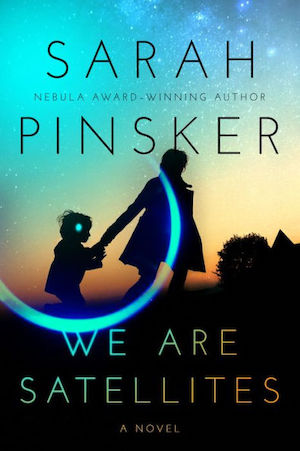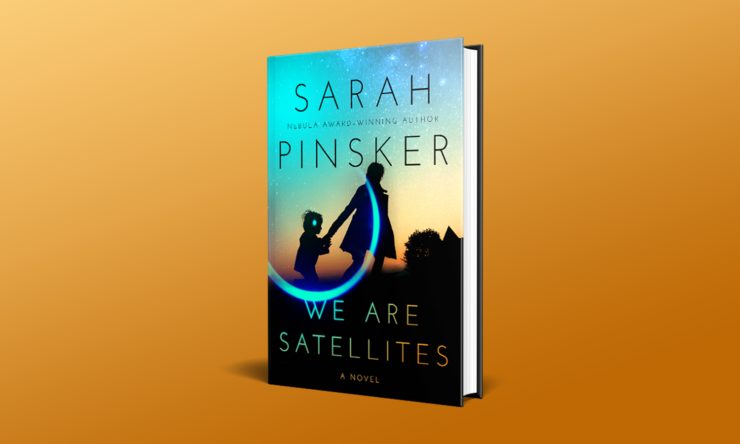We Are Satellites is a book that got quietly and insistently into my head, which is a slightly weird thing to say given that it’s about a technology that literally gets put in people’s heads. Sarah Pinsker’s second novel takes place in a very near future—it could be next month, it could be next year—in which a device called the Pilot has been invented. It’s an implant, and it makes people into optimized versions of themselves: more attentive, more able to multitask, more aware of everything around them.
Having a Pilot is difficult to describe to those who don’t have Pilots, who haven’t experienced this upgraded version of themselves. It’s also difficult to describe what it feels like when a Pilot doesn’t work properly, as teenage David discovers when he finally gets the Pilot he’s been begging his moms for. How does anyone describe what it feels like in their brain? How can I explain to you what the music that constantly plays in my head sounds like, or how as I read over what I’ve just written, I hear it as if someone’s reading it to me? How can you tell me how these things manifest for you? How could you put it into words if something made that all, somehow, more?
The language of our minds is slippery and intimate—and that language is part of what Pinsker thoughtfully explores. In the voices of four members of a family, she teases out a nuanced exploration of some very real-life issues: trust and technology, disability, access, corporate responsibility, and the tricky matter of how much we really know about the tech that shapes our lives.
Though I’ve not read much of her short work yet, between A Song for a New Day and We Are Satellites, I’m ready to crown Pinsker the master of a certain kind of personal, human-sized, just-out-of-our-realm-of-experience SF. (If there is a less unwieldy term for what I’m getting at here, by all means, clue me in.) A Song for a New Day told a story about a future that came to look frightfully familiar in 2020, a fictional world with public gatherings banned in the wake of terrorist attacks and a pandemic. Pinsker’s insider knowledge of what a music scene looks and feels like lent a lived-in feel to her story about a musician trying to keep playing in a changed world, and a naive but well-intentioned young woman who discovers how hard it is to improve things from within the system.
Song is a breathtakingly balanced novel; it’s pretty clear Pinsker is on the side of Luce, the musician, but she also understands and respects Rosemary, whose corporate job nearly destroys Luce’s world. It could’ve been a too-basic argument about “selling out,” but Pinsker layered her story, leaving space for mistakes and growth and the complicated reality of life under capitalism.
Buy the Book


We Are Satellites
Satellites explores similar themes, but adds in much more; it’s a book about how our complicated, fallible, incredible, ordinary minds work, how they all work differently, and how those workings shape our days. At the start, when teenage David first asks for a Pilot, it’s because everyone’s getting one. The device quickly shifts from a fad to a necessity; kids start getting left behind in school, treated differently because they’re not outfitted with the little blue light. David gets his. His mom Julie, who works in politics, gets one. His other mom, Val, is entirely opposed, and his little sister, Sophie, couldn’t get one if she wanted to. Her epilepsy renders her ineligible.
As the technology seeps into their lives, each member of the family reacts differently, and it’s in the smallest details of these reactions that Pinkser’s gift for character shines. Val goes for long runs and worries and gets stressed out and takes out her fear and fury on the military recruiters that appear in the school where she teaches. Julie worries and gets curious and tries to keep tabs on everything online. Sophie, who goes from kid to young adult over the course of the book, fights to establish her own place in the family and the world, gradually learning the extent of her leadership capabilities and strength. And David suffers. Overwhelmed by the “noise” his Pilot creates and unable to convince his colleagues or doctors it’s a real problem, he goes through the motions of a life that seems to fit him poorly, in need of a solution to a problem no one understands.
Pinsker lets us in on each character’s fumbling adjustments to the new Pilot world order, from Sophie’s stompy teen angst to Julie’s well-intentioned invasions of her daughter’s privacy. Every time a character makes a mistake, we see it from all sides: what it feels like to screw up, and what it feels like to watch someone you love stumble. Satellites has the precise, tempered pace of a book in which each word seems the only word that could have followed the one before it. The clarity of the writing leaves room for a density of ideas—about brain plasticity and access and truth and corporate responsibility; addiction and freedom and trust lost and regained; what a family is and how its members can love and infuriate each other in sometimes equal measure.
What’s stuck in my head, though, is Pinsker’s thoughtful consideration of the things we tend to take for granted—who can and can’t take “everyday” things for granted, and what that means on a larger scale. I read her book and then I tried (and failed) to spend less time on Twitter. I thought about all the things we don’t really know about the internet, and all the things we just accept. I thought about the noise in David’s head and how some days, that’s what the avalanche of opinions and details and often unnecessary data on social media can feel like. And I thought about what we need versus what we convince ourselves—or allow ourselves to be convinced—we need.
We Are Satellites isn’t a didactic book against tech or new toys, but a graceful exploration of what one seemingly small change means for one family. It’s easy enough to extrapolate, to imagine how this story radiates outward, replicating itself across the world every time a new device, a new implant, a new technology appears. Capturing the universal in the down-to-earth and specific is one of Pinsker’s gifts, and here it’s on remarkable display.
We Are Satellites is available from Berkley Books.
Molly Templeton lives and writes in Oregon, and spends as much time as possible in the woods. You can also find her on Twitter.










